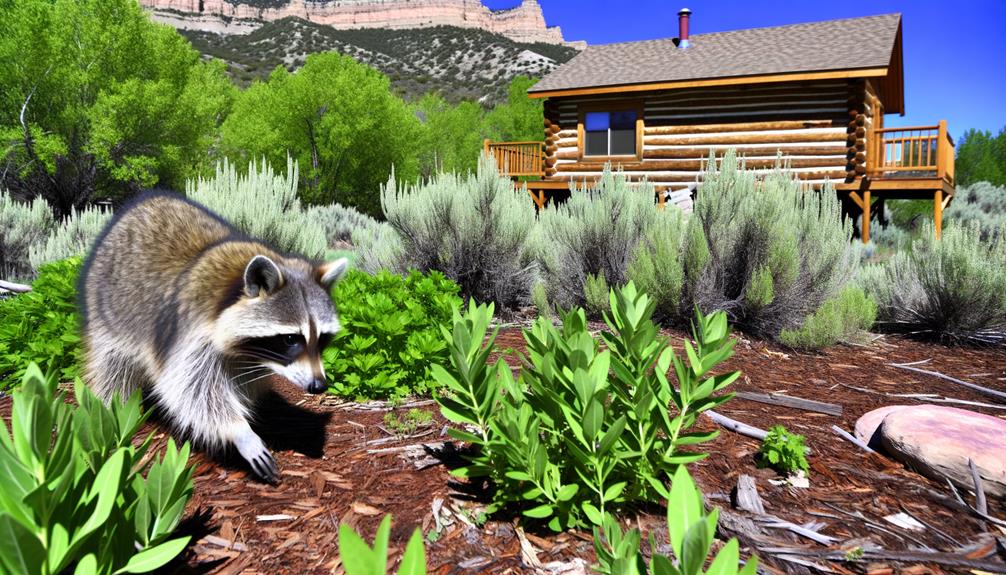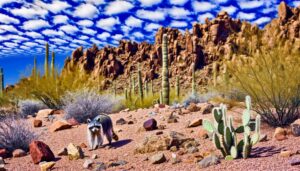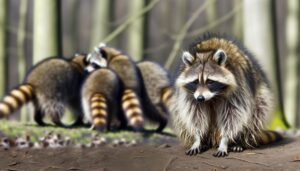How You Can Have a Pet Raccoon in Utah
In Utah, owning a pet raccoon is regulated by the Division of Wildlife Resources (DWR). Prospective owners must obtain a Certificate of Registration (COR) which involves rigorous criteria to ensure appropriate habitat and public health safety.
Compliance with local zoning laws and adherence to strict animal welfare standards are mandatory. Raccoons pose health risks such as rabies, necessitating regular veterinary care and vaccinations.
Unethical treatment can lead to significant penalties, including fines and confiscation. Exploring alternatives like sugar gliders or hedgehogs may offer a less intricate path to pet ownership.
Further insights on this topic are available.

Key Takeaways
- Owning a pet raccoon in Utah requires a Certificate of Registration (COR) from the Utah Division of Wildlife Resources.
- Raccoons are classified as non-domestic animals, necessitating strict adherence to public health and safety regulations.
- Permit types and zoning laws may restrict ownership based on residential area and legal considerations.
- Compliance with animal welfare standards is mandatory to ensure humane treatment and prevent legal penalties.
- Regular veterinary care and vaccinations are essential to manage health and zoonotic disease risks.
Utah's Pet Ownership Laws
Understanding Utah's pet ownership laws is essential for anyone considering keeping a raccoon as a pet in the state.
The Utah Division of Wildlife Resources (DWR) regulates the ownership of wildlife, including raccoons, under the state's wildlife code. According to Utah Administrative Code R657-3, raccoons are categorized as non-domestic animals and possessing them requires a Certificate of Registration (COR).
Prospective raccoon owners must fulfill specific criteria, such as providing a suitable habitat and ensuring the animal does not pose a public health risk. Additionally, the COR application process involves a detailed review of the applicant's ability to meet the animal's needs and adhere to public safety regulations. Compliance with these laws is imperative for the legal and ethical ownership of raccoons.
Raccoon Classification
Raccoons (Procyon lotor) are classified within the order Carnivora and are members of the family Procyonidae, which also includes other small to medium-sized mammals such as coatis and kinkajous.
Native to North America, raccoons are distinguished by their dexterous front paws, facial mask, and ringed tail. Their classification reflects their omnivorous diet and adaptive behaviors, which allow them to thrive in diverse environments, ranging from urban areas to forests.
As nocturnal animals, raccoons are primarily active at night and possess acute senses of sight and hearing. The family Procyonidae is characterized by its members' ability to climb and forage effectively, contributing to their ecological roles as both predators and scavengers.
Permit Requirements
In Utah, obtaining a permit to keep a raccoon as a pet involves understanding the types of permits available, the application process, and the associated legal considerations.
The types of permits can vary depending on the raccoon's origin and intended use, each with specific criteria and documentation requirements.
Applicants must also navigate legal stipulations crafted to guarantee public safety and animal welfare.
Types of Permits
Obtaining a permit to legally own a pet raccoon in Utah involves meeting specific regulatory requirements set forth by the state's Division of Wildlife Resources. The type of permit required is contingent upon several factors, including the raccoon's origin and intended use.
Below are the primary types of permits:
- Wildlife Possession Permit: Necessary for individuals intending to keep a raccoon as a personal pet.
- Rehabilitation Permit: Required for those who aim to care for injured or orphaned raccoons temporarily.
- Exhibition Permit: Needed for using raccoons in educational or commercial displays.
- Scientific Research Permit: Issued to researchers studying raccoons in a controlled environment.
- Breeding Permit: Mandated for those who wish to breed raccoons for conservation or commercial purposes.
Each permit type has specific criteria and conditions to ensure ethical and secure handling of raccoons.
Application Process
The application process for obtaining a permit to own a pet raccoon in Utah involves several detailed steps that guarantee compliance with state regulations and the welfare of the animal. Applicants must complete a thorough form, provide proof of appropriate housing and care, and submit to inspections by wildlife officers. Additionally, the permit requires a non-refundable fee and a background check to verify the applicant's suitability.
| Step | Description |
|---|---|
| Form Submission | Complete and submit the application form. |
| Proof of Housing | Provide documentation of suitable housing setup. |
| Wildlife Inspection | Pass an inspection by state wildlife officers. |
| Fees and Checks | Pay the permit fee and undergo a background check. |
This meticulous process ensures that only qualified individuals are granted the privilege of pet raccoon ownership.
Legal Considerations
Understanding the legal considerations for owning a pet raccoon in Utah requires a detailed review of the specific permit requirements mandated by state law. Prospective raccoon owners must navigate a complex regulatory landscape to guarantee compliance.
Critical legal stipulations include:
- Permit Application: Submission of a thorough application detailing the housing and care provisions for the raccoon.
- Inspection: State officials may conduct home inspections to verify sufficient living conditions.
- Health Certifications: Mandatory health checks and vaccinations must be documented.
- Species Restrictions: Specific guidelines on the type of raccoon allowed as a pet.
- Renewal Requirements: Annual renewal of permits, including updated inspections and health records.
Adherence to these regulations guarantees the welfare of the raccoon and adherence to state laws.
Health and Safety Concerns
Ensuring the health and safety of both the pet raccoon and its human caretakers demands rigorous attention to potential zoonotic diseases, proper living conditions, and behavioral management practices. Raccoons can transmit diseases such as rabies, leptospirosis, and raccoon roundworm, which necessitates regular veterinary care and vaccinations.
Appropriate living conditions include secure enclosures that mimic their natural habitat, preventing escape and ensuring environmental enrichment. Behavioral management is essential, as raccoons possess strong instincts that may lead to aggression if not adequately channeled.
Additionally, a balanced diet tailored to their nutritional needs is vital to prevent obesity and related health issues. Adherence to these guidelines is paramount to fostering a safe and healthy environment for both the raccoon and its caretakers.
Ethical Considerations
Beyond health and safety concerns, the ethical implications of keeping a pet raccoon in Utah warrant thorough consideration, particularly regarding the animal's welfare and the broader environmental impact.
Raccoons are wild animals with complex needs that can be difficult to fulfill in a domestic setting. Ensuring their well-being involves understanding their natural behaviors and environmental requirements.
- Natural Habitat Needs: Captivity conditions may not replicate their natural habitats.
- Behavioral Stress: Confinement can lead to psychological stress and abnormal behaviors.
- Ecological Disruption: Potential release or escape can disrupt local ecosystems.
- Legal and Conservation Issues: Keeping raccoons may contravene wildlife protection laws.
- Ethical Responsibility: Owners must consider the moral implications of domesticating wild animals.
These factors underscore the importance of making ethically sound decisions.
Raccoon Behavior and Needs
Raccoons exhibit a variety of complex behaviors and have specific environmental needs that must be addressed to ensure their well-being in captivity. They are nocturnal, highly intelligent, and display considerable dexterity, often using their front paws to explore and manipulate objects.
Their diet is omnivorous, requiring a balanced mix of fruits, vegetables, proteins, and grains. Concerning habitat, raccoons need ample space to climb, forage, and nest. Enclosures must be secure to prevent escapes and enriched with activities that stimulate their cognitive and physical abilities.
Social interaction is also vital, as raccoons are inherently social animals. Meeting these requirements is necessary for their health and to mitigate behavioral issues, such as aggression or anxiety, that can arise from inadequate care.
Potential Legal Consequences
Understanding the specific behavioral and environmental needs of raccoons is critical, but it is equally important to be aware of the potential legal consequences of keeping them as pets in Utah.
Regulatory compliance is essential to avoid penalties. Key legal considerations include:
- Permits: Required for keeping wildlife, including raccoons, to guarantee controlled environments.
- Zoning Laws: Specific areas may restrict exotic pets, affecting residential decisions.
- Public Health: Potential disease vectors, like rabies, necessitate strict health regulations.
- Animal Welfare: Adherence to standards ensuring humane treatment is mandated.
- Penalties: Violations can result in fines, confiscation of the animal, or legal action.
Understanding and ensuring these legalities is fundamental for those wishing to responsibly serve the needs of both the animals and their community.
Alternative Pets
For individuals interested in keeping unique pets while avoiding the complexities associated with raccoons, several alternative animals may serve as suitable companions. Sugar gliders, small nocturnal marsupials, exhibit social behavior and glide between trees using a membrane stretching from wrist to ankle.
Hedgehogs, known for their spiny coats, are relatively low-maintenance and require minimal space. Additionally, ferrets, domesticated for centuries, display playful and curious dispositions, making them engaging pets.
Each of these animals requires specific care conditions, such as temperature regulation for sugar gliders and appropriate housing for hedgehogs and ferrets. Prospective pet owners must thoroughly research the needs of these animals to guarantee their well-being and compliance with local regulations.
Finding More Information
To guarantee the responsible ownership of unconventional pets, including raccoons, it is essential to seek thorough and dependable information from credible sources. Begin by consulting local and state regulations on wildlife ownership.
Reliable sources for information include:
- Utah Division of Wildlife Resources: Offers guidelines and legal requirements.
- Veterinary professionals: Provide health and care insights specific to raccoons.
- Wildlife rehabilitators: Share practical advice and ethical considerations.
- Local animal control agencies: Inform about potential neighborhood impacts.
- Educational institutions: Offer research and scientific data on raccoon behavior and needs.
Engaging with these resources ensures you are well-informed about the legal, ethical, and practical aspects of owning a raccoon in Utah, facilitating a responsible and informed decision-making process.
Conclusion
Utah's stringent pet ownership laws present numerous challenges for those considering a raccoon as a companion animal. The classification of raccoons, coupled with rigorous permit requirements, underscores the complexity of legal ownership. Health, safety, and ethical concerns further complicate the situation.
Understanding raccoon behavior and needs is essential, as is awareness of potential legal repercussions. With alternative pets available, the decision to pursue a raccoon remains fraught with uncertainty. One must ponder: is it truly worth the risk and responsibility?






